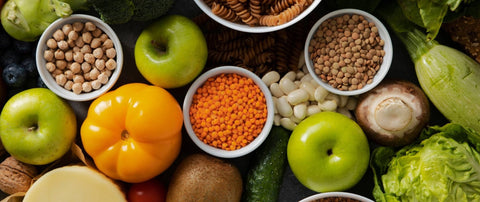A taboo topic for some, for others, one of the most important issues of all: our digestion. It is the center of our nutrient supply and health. Digestion is vital for regulating our water balance, producing important hormones and messenger substances and fighting off pathogens. A well-functioning digestive system and healthy intestinal flora have an effect on our immune system, the appearance of our skin and even our mood. In turn, psychological stress affects the digestive system in many people. Anxiety before an exam, stress before an important appointment or even joyful anticipation can disrupt the balance of the gut. So there are many good reasons to pay a little more attention to our largest organ.
Inhaltsverzeichnis
5 useful tips to stimulate your digestion
The intestinal flora is a delicate interplay of different microorganisms. If it gets out of balance, this manifests itself in digestive problems such as diarrhea, constipation or flatulence. However, skin impurities, increased susceptibility to infections or slight irritability can also be an indication of an unbalanced gut. Due to this sensitivity, the support you give your microbiome should be as gentle as possible. Here are five very simple and natural home remedies that you can use to stimulate your digestion and thus support your gut and your overall well-being.
Tip 1 - Dietary fiber is key
Although it is not a vital nutrient, fiber is extremely important for a healthy diet and good digestion. This category includes various plant components that are not broken down by enzymes in the small intestine and therefore reach the large intestine unchanged. There they serve as food for the intestinal bacteria and thus ensure that the balance of the intestinal flora is maintained. Although we are talking about bacteria here, we are not talking about pathogens. Quite the opposite: the intestinal microbiome refers to the multitude of helpful microorganisms that live in our intestines and even protect it against hostile pathogens. More than 2000 different types of bacteria are known and their composition is as individual as our fingerprint. What they all have in common, however, is the fact that they need food. As they live in the large intestine, it is important that the food we eat is not utilized beforehand. This is where the nature of dietary fiber comes into play. They remain undigested until they reach the large intestine, where they serve as food for the protective bacteria. As they are metabolized by the intestinal bacteria, various substances are produced that maintain the intestinal environment and thus keep your intestinal flora in balance and stimulate your digestion.
Something that all dietary fibers have in common is a strong swelling capacity, i.e. the ability to bind water. The increase in volume exerts pressure on the intestinal wall. This in turn stimulates peristalsis, i.e. the movement of the intestine, and ensures that food passes through the intestine more quickly. This means that toxins that our body excretes remain in the intestine for a shorter period of time. Various studies have linked a more rapid passage of food through the intestine with a reduced risk of bowel cancer. (5)
The FDA's recommended daily intake of dietary fiber for adults is 30g per day. On average, however, adults in the US only consume about 15g. Psyllium husks are a good home remedy that you can use to increase your fiber intake and boost your digestion. They are ideal as a topping for a salad or as an addition to a smoothie. You can also take them on their own before a meal. It is important that you always drink plenty of water.

Get natural digestive support now!
Ad
Tip 2 - Eat fermented foods more often
People have been fermenting food to preserve it for thousands of years. The first evidence of fermentation was found in China and dates back to the 7th millennium B.C. Since then, however, the craft of fermentation has spread to all parts of the world. Be it vegetables, fish, dairy products or cereals, fermentation is a tradition in many cultures.
Even though food was initially only fermented to preserve it, we are now aware of the numerous health benefits that fermented foods bring. For this reason, sourdough and co. are currently taking over the kitchens of the world. For example, there is evidence of a reduction in the risk of heart disease, diabetes, chronic inflammatory bowel disease and muscle soreness after training³. One thing is certain: fermented foods have a positive effect on our intestinal microbiome. They help to keep the bacterial strains in balance, which contributes to well-functioning digestion. Fermented foods contain probiotics, bacteria that help your gut fight pathogens. By eating probiotics, you ensure that the 'good' bacteria remain in the majority and 'bad' bacteria don't stand a chance. Fermented foods are also easier to digest than their natural counterparts. Cabbage, for example, loses its flatulent effect during fermentation. Integrating natural yoghurt, kimchi, kombucha or sourdough bread into your diet more often is therefore an ideal and simple way to promote intestinal health.
Tip 3 - Ensure calcium supply
The mineral is usually associated with strong and healthy bones, but it can do even more. You can also stimulate your digestion with calcium, as it is an important factor for the function of our digestive enzymes. These break down our food into its individual components so that they can be utilized by the body. They therefore ensure that all the nutrients we consume are absorbed as required. If the digestive enzymes do not function properly, the food cannot be digested optimally. Important nutrients are then not absorbed but simply excreted. This means that your body will not benefit from the many vitamins and minerals you consume if the enzymes are not working properly. You can support your digestion and digestive enzymes with a sufficient calcium intake. Whole milk, yogurt and kefir, for example, have a high calcium content, as do green vegetables such as spinach and broccoli. Pulses such as chickpeas and white beans are also good sources of calcium.

Tip 4 - Opt for herbal helpers
The centuries-old knowledge of naturopathy is still relevant in our modern society. It provides a good and gentle alternative to chemical products for many minor ailments. Some plants are known to soothe the intestines, have a decongestant effect and thus increase well-being. The go-to digestive aid in the medicine cabinet is a tea made from fennel, aniseed and caraway. Although the taste is certainly debatable, the duration of its use speaks for itself. Caraway is also traditionally used as a spice in dishes containing flatulent ingredients, for example in coleslaw. This is said to alleviate the flatulent effect of cabbage during the meal. In many Asian countries, mukhwas are served after a meal. These are fennel seeds partially coated with sugar, which are chewed to combat bad breath and prevent digestive problems. The effect on the intestines is attributed to the essential oils they contain, which have anti-inflammatory and antispasmodic properties. They have been used for centuries as a household remedy to stimulate digestion. Fennel and caraway are a real power duo when it comes to herbal digestive aids.
Tip 5 - Keep in motion
Exercise is the solution to so many problems. And its absence is the root of so many ailments that we struggle with as a society. Movement stimulates circulation, promotes bone, joint and muscle health, improves our mood and prevents cardiovascular disease. The list goes on and on. Exercise also plays an important role in digestion. When blood circulation is stimulated, the intestines also work more actively. But it doesn't have to be a sprint or 5 k run. Even small movements can stimulate your digestion. A relaxed walk after a meal or various exercises that you can integrate into your daily routine can help. For example, you can take the stairs instead of the elevator or walk instead of taking the bus or train for shorter distances.
Harmony in your stomach at last
The base of our immune system, gut brain, gut feeling - the various terms associated with the gut show how important it is for our health. A gut that is out of balance can have an impact on numerous aspects of physical and mental health. Accordingly, a healthy gut is the best foundation for our health and general well-being. With these five tips and home remedies, you can stimulate your digestion naturally and easily and are well on your way to a harmonious gut and a good gut feeling.
Sources:
- Fu J, Zheng Y, Gao Y, Xu W. Dietary Fiber Intake and Gut Microbiota in Human Health. Microorganisms. 2022 Dec 18;10(12):2507. doi: 10.3390/microorganisms10122507. PMID: 36557760; PMCID: PMC9787832.https://www.ncbi.nlm.nih.gov/pmc/articles/PMC9787832/
- Hu J, Wang J, Li Y, Xue K, Kan J. Use of Dietary Fibers in Reducing the Risk of Several Cancer Types: An Umbrella Review. Nutrients. 2023 May 30;15(11):2545. doi: 10.3390/nu15112545. PMID: 37299507; PMCID: PMC10255454. https://www.ncbi.nlm.nih.gov/pmc/articles/PMC10255454/
- Leeuwendaal NK, Stanton C, O'Toole PW, Beresford TP. Fermented Foods, Health and the Gut Microbiome. Nutrients. 2022 Apr 6;14(7):1527. doi: 10.3390/nu14071527. PMID: 35406140; PMCID: PMC9003261. https://www.ncbi.nlm.nih.gov/pmc/articles/PMC9003261/
- Kirchhoff P, Geibel JP. Role of calcium and other trace elements in the gastrointestinal physiology. World J Gastroenterol. 2006 May 28;12(20):3229-36. doi: 10.3748/wjg.v12.i20.3229. PMID: 16718844; PMCID: PMC4087967. https://www.ncbi.nlm.nih.gov/pmc/articles/PMC4087967/
- Song BK, Cho KO, Jo Y, Oh JW, Kim YS. Colon transit time according to physical activity level in adults. J Neurogastroenterol Motil. 2012 Jan;18(1):64-9. doi: 10.5056/jnm.2012.18.1.64. Epub 2012 Jan 16. PMID: 22323989; PMCID: PMC3271256. https://www.ncbi.nlm.nih.gov/pmc/articles/PMC3271256




 DE-ÖKO-006
DE-ÖKO-006
